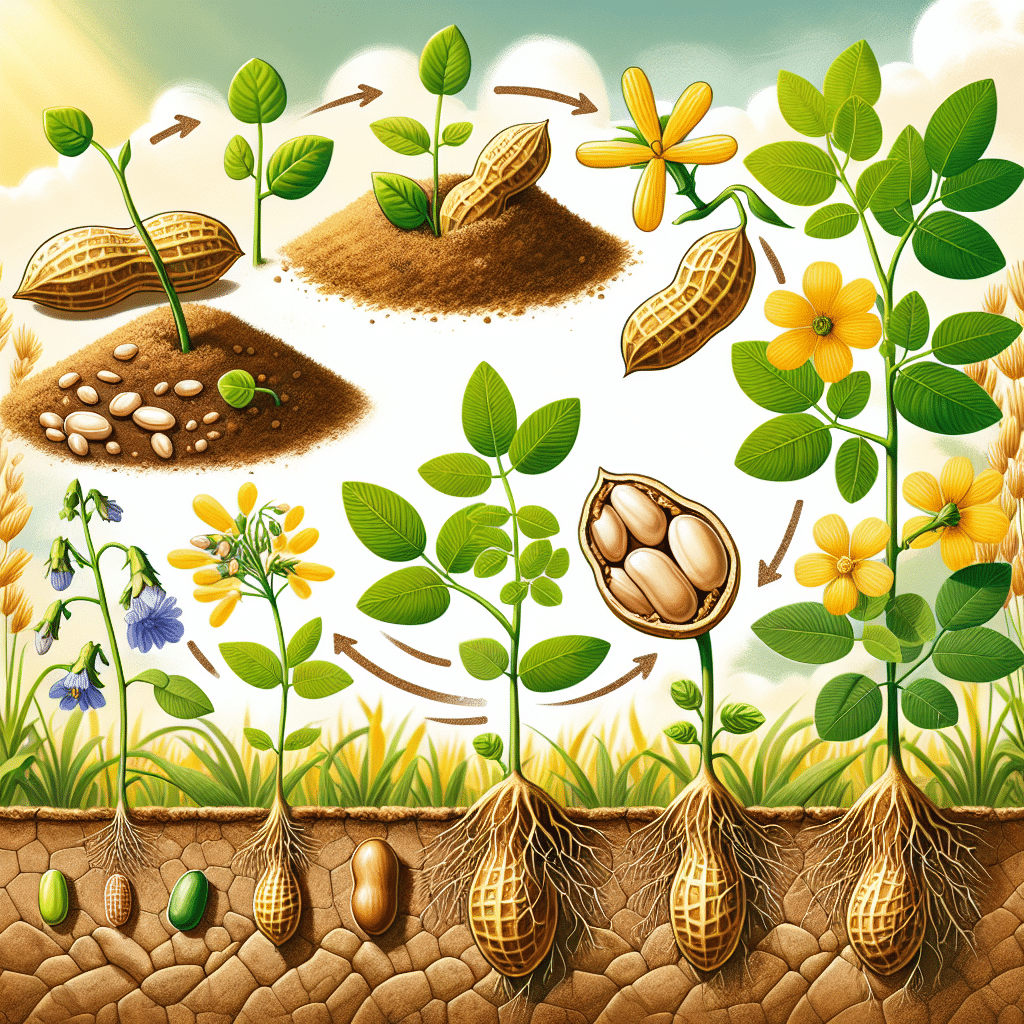Where Do Peanuts Grow From: Nut’s Origin Story
-
Table of Contents
- Peanuts: Unearthing the Nut’s Fascinating Origin Story
- The Botanical Background of Peanuts
- From Soil to Snack: How Peanuts Grow
- The Historical Roots of Peanuts
- Global Cultivation and Economic Impact
- Nutritional Profile and Health Benefits
- Conclusion: The Enduring Legacy of Peanuts
- Discover ETprotein’s Premium Peanut Protein Products
Peanuts: Unearthing the Nut’s Fascinating Origin Story

Peanuts, despite their name, are not true nuts but legumes that have captivated taste buds around the world. From being a staple in diets to becoming a key ingredient in various culinary delights, peanuts have a rich history and an even more interesting growth process. In this article, we will delve into the origin story of peanuts, explore where they grow, and understand their significance in global agriculture and economy.
The Botanical Background of Peanuts
Peanuts, scientifically known as Arachis hypogaea, belong to the legume family, which includes beans, lentils, and soy. Unlike their tree-growing nut cousins, peanuts develop underground, which is why they’re also referred to as groundnuts or earthnuts. The peanut plant itself is an annual herbaceous plant that can grow up to 18 inches tall.
From Soil to Snack: How Peanuts Grow
The growth cycle of peanuts is unique and fascinating. It begins with the planting of peanut seeds in warm, well-drained soil after the last frost of the season. The plants thrive in sandy loam and require a long, warm growing season to mature. Here’s how the process unfolds:
- Germination: Peanut seeds germinate and sprout into plants.
- Flowering: Yellow flowers blossom on the peanut plants.
- Pegging: After pollination, the flowers’ ovaries elongate and grow towards the ground, a process known as “pegging.”
- Development: The pegs enter the soil, where the peanuts develop and mature in protective pods.
- Harvesting: Once mature, the entire plant is pulled from the soil, revealing the peanut pods attached to the roots.
This subterranean development is what sets peanuts apart from other nuts and contributes to their distinctive taste and nutritional profile.
The Historical Roots of Peanuts
Peanuts are believed to have originated in South America, with archaeological evidence suggesting that ancient cultures in modern-day Bolivia and Peru cultivated peanuts over 7,600 years ago. These early peanut varieties were likely quite different from the ones we consume today, as centuries of selective breeding have shaped their size, flavor, and yield.
Through trade and exploration, peanuts spread throughout the globe. They reached Africa via Spanish and Portuguese explorers and were later brought to North America during the transatlantic slave trade. In the United States, peanuts went from being a regional crop to a national commodity, thanks in part to the work of agricultural scientist George Washington Carver, who developed over 300 uses for peanuts in the early 20th century.
Global Cultivation and Economic Impact
Today, peanuts are grown in tropical and subtropical regions across the globe, with China, India, and the United States being the top producers. The cultivation of peanuts plays a significant role in the economies of many countries, providing income for millions of smallholder farmers and contributing to the global trade market.
The versatility of peanuts means they are not only consumed as snacks but also processed into various products such as peanut butter, oil, flour, and animal feed. This versatility has made peanuts an invaluable crop in both developed and developing nations.
Nutritional Profile and Health Benefits
Peanuts are not only delicious but also packed with essential nutrients. They are an excellent source of protein, healthy fats, vitamins, and minerals. Here are some of the health benefits associated with consuming peanuts:
- Heart Health: Peanuts contain monounsaturated and polyunsaturated fats, which can help lower bad cholesterol levels.
- Protein Power: As a plant-based protein source, peanuts are great for vegetarians and vegans looking to increase their protein intake.
- Weight Management: The fiber and protein in peanuts can help keep you full, aiding in weight management.
- Antioxidant Rich: Peanuts contain antioxidants like resveratrol, which can help combat oxidative stress in the body.
Despite these benefits, it’s important to note that peanuts can cause severe allergic reactions in some individuals, which has led to increased awareness and regulation around peanut consumption and labeling.
Conclusion: The Enduring Legacy of Peanuts
The story of peanuts is one of humble beginnings, global journeys, and agricultural innovation. From their ancient origins in South America to their widespread cultivation around the world, peanuts have become a dietary staple and an economic powerhouse. Their unique growth process, nutritional benefits, and versatility continue to make them a valuable crop and a beloved snack for people everywhere.
Whether enjoyed as a quick snack, transformed into creamy peanut butter, or used as a protein-rich addition to meals, peanuts have secured their place in the pantheon of important agricultural products. Their origin story is a testament to the ingenuity of early farmers and the power of selective breeding in shaping the foods we enjoy today.
Discover ETprotein’s Premium Peanut Protein Products
If you’re looking for high-quality peanut protein products, ETprotein is your go-to source. Their peanut protein is perfect for enhancing your diet or for use in various food and beverage applications. With a commitment to non-GMO, allergen-free ingredients, ETprotein ensures that you receive the best plant-based proteins on the market.
Whether you’re a manufacturer, distributor, or just someone looking to incorporate more plant-based proteins into your lifestyle, ETprotein’s range of products is designed to meet your needs. Experience the benefits of peanut protein and other plant-based proteins by reaching out to ETprotein for your supply.
About ETprotein:
ETprotein, a reputable protein Chinese factory manufacturer and supplier, is renowned for producing, stocking, exporting, and delivering the highest quality organic bulk vegan protein and plant proteins. They include Organic rice protein, clear rice protein, pea protein, clear pea protein, pumpkin seed protein, sunflower seed protein, mung bean protein, peanut protein etc. Their offerings, characterized by a neutral taste, non-GMO, allergen-free attributes, cater to a diverse range of industries. They serve nutraceutical, pharmaceutical, cosmeceutical, veterinary, as well as food and beverage finished product distributors, traders, and manufacturers across Europe, USA, Canada, Australia, Thailand, Japan, Korea, Brazil, and Chile, among others.
ETprotein specialization includes exporting and delivering tailor-made protein powder and finished nutritional supplements. Their extensive product range covers sectors like Food and Beverage, Sports Nutrition, Weight Management, Dietary Supplements, Health and Wellness Products, and Infant Formula, ensuring comprehensive solutions to meet all your protein needs.
As a trusted company by leading global food and beverage brands and Fortune 500 companies, ETprotein reinforces China’s reputation in the global arena. For more information or to sample their products, please contact them and email sales(at)ETprotein.com today.












